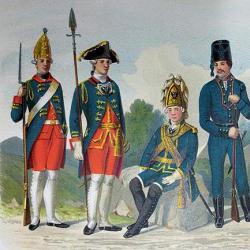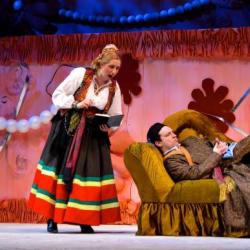“Marriage”, analysis of Gogol’s comedy. Nikolai Vasilyevich Gogol marriage Podkolesin hero
Towards evening, Agafya Tikhonovna is tormented about who she should choose. Everyone seems to be good and good, but everyone also has shortcomings. As a result, she tries to cast lots, but she is stopped by Kochkarev, who came before everyone else and identified himself as a relative. He slanders other suitors and convinces Agafya Tikhonovna to choose Podkolesin and drive away the other suitors. At this time, other grooms begin to arrive, everyone wants to come a little early to talk with the bride alone, but as a result they only disturb each other. In the end, Agafya Tikhonovna, driven into a corner, decides to take Kochkarev’s advice, drives them away (“Get out! Oh, my God! What did I say?”) and runs away herself. Kochkarev, who came under the guise of a relative, tells various unpleasant things about her, such as “She is a fool”, “There is no dowry for her”, “[She does not know French] Neither belmes” (Very important for Anuchkin). The suitors first want to check, but when the matchmaker arrives they can’t stand it and instead of “the strictest interrogation” they swear at her and leave, convinced that Kochkarev told the truth. There remains only Zhevakin, full of knightly ideals, that heaven is sweet even in a hut. Kochkarev simply deceives him and throws him out the door.
After this, Kochkarev brings Podkolesin, now the only groom, to Agafya Tikhonovna and leaves them alone so that Podkolesin proposes to her. But Podkolesin does not dare, and after a short conversation he leaves about nothing. Kochkarev is horrified: everything is already ready, he needs to go to church in an hour. They quarreled, and Podkolesin leaves.
Meanwhile, Agafya Tikhonovna dreams of a future married life and worries that it is Podkolesin who is “hanging around for so long.” Kochkarev somehow manages to make peace with Podkolesin, bring him back to Agafya Tikhonovna and almost force him to propose. But Podkolesin changes his mind at the last second, so Kochkarev makes an offer for him. Agafya Tikhonovna runs to get dressed to go to church. Podkolesin, on an emotional high, thanks Kochkarev. After this, Kochkarev goes away for a few minutes to check that everything has been cleaned, taking Podkolesin’s hat just in case so that he doesn’t run away. Alone, Podkolesin realizes the irreparability of marriage (“For the rest of my life, for the whole century, be that as it may, tie myself down and after that there is no excuse, no repentance, nothing, nothing - it’s all over, it’s all done.”), and decides how... or leave. But it’s impossible, because there are people standing everywhere in the house, “well, they’ll ask: why?” As a result, he jumps out the window and drives home.
Meanwhile, Agafya Tikhonovna with Fyokla and Arina Panteleimonovna cannot understand where Podkolesin has gone. Kochkarev, who came running, was also amazed by the disappearance of his friend. The yard girl Dunyashka says that “they jumped out the window...”. The marriage is upset, the aunt, scolding the nobles and Kochkarev in particular, takes Agafya Tikhonovna away, and Fyokla vindictively scolds Kochkarev and drives him away. Left alone, Thekla sarcastically remarks: “Even if he ran out the door, it would be a different matter, but if the groom rushed out the window, then it’s just my respect!”
Characters
- Agafya Tikhonovna Kuperdyagina- merchant's daughter, bride
- Arina Panteleimonovna- aunt
- Fyokla Ivanovna- matchmaker
- Ivan Kuzmich Podkolesin- employee, court councilor
- Ilya Fomich Kochkarev- his friend
- Ivan Pavlovich Scrambled eggs- executor, collegiate assessor
- Nikanor Ivanovich Anuchkin- retired infantry officer
- Baltazar Baltazarovich Zhevakin- retired sailor, lieutenant
- Dunyashka- girl in the house
- Alexey Dmitrievich Starikov- hotel palace, “a good trader on the cloth line”
- Stepan- servant Podkolesin
- Cab
Gogol's comedy "Marriage" was prepared for publication and first staged in 1842. The first reviews of both the production and the printed text were mostly negative and did not live up to the author's expectations. Let's try to figure out why.
History of creation and first productions
Gogol began work on the comedy “Marriage” in 1833. Over the course of eight years, the title changed (the first version was “Grooms”), the location (transferred from the village to St. Petersburg), and the plot (initially Podkolesin and Kochkarev were absent, and the bride was a landowner). The writer planned to submit the play for production in the spring of 1836, but the final point in it was delivered only 5 years later, abroad.
The premiere of Gogol's comedy "Marriage" took place in early December 1842 at the Alexandria Theater, and two months later - in Moscow. None of them had the desired success, which was partly due to the behavior of the actors: many of them simply did not understand the essence of what was happening. And on the St. Petersburg stage, after the final curtain, there was a hiss: such stories usually ended with a happy reunion of lovers, but here we had to look for an explanation for Podkolesin’s action. Subsequent productions turned out to be more successful, and now one of the advantages of the play is that it presents a broad picture of the life of different class groups in the first half to mid-19th century.
Let's see how Gogol portrays his contemporary in the comedy “Marriage”.
Summary of action 1. Meet the main character
Court Councilor Podkolesin is a bachelor, but has long dreamed of getting married. He had already turned to the matchmaker, Fekla Ivanovna, ordered a tailcoat from the tailor, and the servant Stepan bought blacking for his boots. It seems that all the hero can do is meet his future bride.
Podkolesin's conversation with the servant about how preparations for the wedding are going is interrupted by a visit from the matchmaker: she came to talk about the new girl. The court councilor immediately bombards her with questions about the age of the bride, what is included in the dowry, and whether she is pretty. Fekla Ivanovna reports that Agafya Tikhonovna is the daughter of a merchant, but she definitely wants to see a nobleman as her husband. She has a substantial dowry and is pretty. After listening, Podkolesin asks to come the day after tomorrow - during this time he will think about everything. “This has been going on for three months now,” the matchmaker reproaches him and adds that she has other suitors in mind.
Gogol's "Marriage" continues with the appearance of Kochkarev, the groom's friend. At first he scolds Fyokla Ivanovna for marrying him, but having learned what the matter is, he immediately begins to insist that a wedding is the best event in life. And today he undertakes to introduce Podkolesin to his bride and arrange his fate.

In the house of Agafya Tikhonovna
While Kochkarev lifts the court councilor from the sofa and forces him to go to the bride, Fekla Ivanovna introduces the merchant’s daughter to potential suitors: Scrambled eggs, Anuchkin, Zhevakin. First in words, and then in person: soon they will appear in the house.
Having met the suitors, Agafya Tikhonovna feels awkward and runs away, and Fekla Ivanovna invites everyone to evening tea for a better acquaintance. Kochkarev, who finally pulled his friend out of the house and witnessed the meeting scene, convinces Ivan Kuzmich that he cannot find a better match and that he needs to act immediately.
Thus, in the first part of the play, people appear before the viewer who want to find for themselves a certain ideal created in the imagination. At the same time, none of them remembers that the main thing in marriage is the union of two kindred souls. Gogol brings us to such thoughts in the comedy “Marriage”.

Summary of actions 2. Results of Kochkarev’s activities
The hero, who has decided to marry Podkolesin at any cost, takes the initiative into his own hands. First, Kochkarev assures Agafya Tikhonovna, who is preoccupied with the upcoming choice of groom - she even decided to draw lots in connection with this - that it is better not to find Ivan Kuzmich. His move is successful: the bride drives away the men who have reappeared in her house and runs away. Left alone with Eggs, Anuchkin, and Zhevakin, Kochkarev introduces himself as a relative of the heroine and talks about her “shortcomings.” Finally, he arranges a conversation between the bride and Podkolesin, in the hope that the latter will propose. However, the viewer witnesses their timid conversation about nothing and shy silence - it sometimes helps to understand the inner feelings of the hero. Thus, instead of a happy logical ending to the comedy “Marriage,” Gogol develops the action further.

Groom's Elopement
Now Kochkarev proposes to Agafya Tikhonovna for his indecisive friend. He had already agreed on the wedding and ordered dinner. The bride went to put on an outfit that had long been prepared for this occasion. It seems that this time everything was done by the initiative Kochkarev so that the marriage could take place in the evening.
Gogol - the summary showed this - portrays Podkolesin as an apathetic person, incapable of decisive changes in life. And at that moment, when everything had already been decided, the enthusiastic state caused by the conversation with the girl suddenly gives way to panic and fear of a new life. The hero finds nothing better than to jump out the window and go home. And Agafya Tikhonovna, her aunt, the matchmaker and Kochkarev himself who appeared on the stage, upon learning about this, are shocked. With Fekla’s phrase “even if he ran out the door, it would be a different matter, but if the groom rushed out the window, then it would be right there...” N.V. concludes the play. Gogol. “Marriage” is a comedy, at the end of which the viewer must involuntarily think about the question of what made the hero, who was almost ready for change, act in such a way.

Characteristics
As already noted, the basis of the comedy was the depiction of typical characters of the mid-century. Let's take a closer look at them.
The first groom is Scrambled eggs, a rude and ignorant executor who dropped in here in passing. He was flattered by a rich dowry and therefore immediately begins to check whether everything from the list compiled by the matchmaker is available. He doesn’t care what kind of wife he turns out to be, even a fool, as long as the “surplus items” are good.
Anuchkin, an infantry soldier, wants to have a lady next to him who certainly speaks French and has secular manners, otherwise it won’t be the same. At the same time, high society is closed to him, and he himself does not understand anything in French.
Former sailor Zhevakin, who once traveled to Sicily, wants to have a wife in his body, so that she will be “a kind of rose.” And not once during the development of the action of Gogol’s comedy “Marriage” is the question of the spiritual qualities of the bride and grooms, of mutual love or at least sympathy, touched upon. Everything is measured by the amount of dowry and far-fetched whims that have no relation to real life.
Podkolesin in many ways resembles Oblomov I. Goncharov - the same lazy person and a person who is afraid to take responsibility. Moreover, at first he cannot decide on his attitude towards the bride: it seems to him that she is really stupid, has a long nose and is worth nothing without French. However, with the same ease with which Ivan Kuzmich previously accepted the point of view of each of the suitors, he agrees with his friend that Agafya Tikhonovna is almost ideal. For him, what is more important is the impression made by a phenomenon, an object, a face on other people, and not its true content. “Marriage” - Gogol uses techniques for creating a psychological portrait in the play - exposes the most negative social vices.
Kochkarev also looks comical, possessing great power of suggestion and receiving pleasure as a result of vigorous activity. This is an example of an unprincipled and cunning person who will stop at nothing to achieve his goal. He turns the destinies of others to suit himself, and therefore his energy does more harm than good.
All the characters created in the play, including women, are multifaceted and surprisingly realistic.

The meaning of comedy
“Marriage” became one of the first Russian comedies, the center of which was an ordinary everyday scene, funny and sad at the same time. It was significantly ahead of its time and predetermined the appearance of A. Ostrovsky’s plays and, to some extent, Goncharov’s novel “Oblomov.”
Nikolai Vasilyevich Gogol
Marriage
(Written in 1833)
CHARACTERS
Agafya Tikhonovna, merchant's daughter, bride.
Arina Panteleimonovna, aunt.
Fekla Ivanovna, matchmaker.
Podkolesin, employee, court councilor,
Kochkarev, his friend.
Fried eggs, executor.
Anuchkin, retired infantry officer.
Zhevakin, sailor.
Dunyashka, girl in the house.
Old people, hotel palace.
Stepan, servant of Podkolesin.
ACT ONE
PHENOMENON I
Bachelor's room.
Podkolesin alone, lying on the sofa with a pipe.
This is how you start thinking alone in your spare time, and you see that you finally definitely need to get married. What, really? You live and live, but it finally becomes so bad. The meat eater missed it again. But it seems that everything is ready, and the matchmaker has been going around for three months now. Right - somehow one becomes ashamed. Hey Stepan!
SCENE II
Podkolesin, Stepan.
Podkolesin. The matchmaker didn't come?
Stepan. No way.
Podkolesin. Did you have a tailor?
Stepan. Was.
Podkolesin. Well, is he sewing a tailcoat?
Stepan. Sews.
Podkolesin. And have you already sewed a lot?
Stepan. Yes, that's enough. I started throwing loops.
Podkolesin. What are you saying?
Stepan. I say: I’ve already started throwing loops.
Podkolesin. But he didn’t ask what the master needed a tailcoat for?
Stepan. No, I didn't ask.
Podkolesin. Maybe he was saying if the master wanted to get married?
Stepan. No, I didn't say anything.
Podkolesin. Have you seen, however, he has other tailcoats? After all, he also sews for others?
Stepan. Yes, he has a lot of tailcoats hanging around.
Podkolesin. However, surely the cloth on them will be worse than on mine?
Stepan. Yes, it will look better than what’s on yours.
Podkolesin. What are you saying?
Stepan. I say: this is a closer look at what’s on yours.
Podkolesin. Fine. Well, he didn’t ask: why does the master sew a tailcoat from such thin cloth?
Stepan. No.
Podkolesin. Didn’t say anything about not wanting to get married?
Stepan. No, I didn’t talk about that.
Podkolesin. However, you said what is my rank and where do I serve?
Stepan. Told you.
Podkolesin. What does he have to do with this?
Stepan. He says: I will try.
Podkolesin. Fine. Now go.
Stepan leaves.
SCENE III
Podkolesin one.
I am of the opinion that a black tailcoat is somehow more respectable. Colored people are more suitable for secretaries, titular and other small fry, something milky. Those of higher rank should observe more, as they say, this... I forgot the word! and a good word, but I forgot. Yes, father, no matter how you turn it around, the court councilor is the same colonel, except that the uniform is without epaulettes. Hey Stepan!
PHENOMENA IV
Podkolesin, Stepan.
Podkolesin. Did you buy wax?
Stepan. Bought.
Podkolesin. Where did you buy it? In that shop I told you about, on Voznesensky Prospekt?
Stepan. Yes, sir, in the same one.
Podkolesin. Well, is the polish good?
Stepan. Good.
Podkolesin. Have you tried cleaning your boots with it?
Stepan. I tried it.
Podkolesin. Well, does it shine?
Stepan. She sparkles well.
Podkolesin. And when he gave you a polish, he didn’t ask why the master needed such a polish?
Stepan. No.
Podkolesin. Maybe he didn’t say: is the master planning to get married?
Stepan. No, I didn't say anything.
Podkolesin. Well, okay, go ahead.
PHENOMENA V
Podkolesin one.
It seems that boots are an empty thing, but, however, if they are poorly made and have red polish, there will not be such respect in good society. Everything is somehow not right... It’s even disgusting if you have calluses. I’m ready to endure God knows what, just to avoid blisters. Hey Stepan!
SCENE VI
Podkolesin, Stepan.
Stepan. What do you want?
Podkolesin. Did you tell the shoemaker not to have calluses?
Stepan. Said.
Podkolesin. What is he saying?
Stepan. He says okay.
Stepan leaves.
SCENE VII
Podkolesin, Then Stepan.
Podkolesin. But marriage is a troublesome thing, damn it! This, yes that, yes this. So that it would work properly - no, damn it, it’s not as easy as they say. Hey Stepan!
Stepan enters.
I also wanted to tell you...
Stepan. The old woman came.
Podkolesin. Ah, she came; call her here.
Stepan leaves.
Yes, this is a thing... a wrong thing... a difficult thing.
SCENE VIII
Podkolesin And Thekla.
Podkolesin. Ah, hello, hello, Fekla Ivanovna. Well? How? Take a chair, sit down, and tell me. Well, so how, how? What do you call her: Melania?..
Thekla. Agafya Tikhonovna.
Podkolesin. Yes, yes, Agafya Tikhonovna. And right, some forty-year-old maiden?
Thekla. No, no, no. That is, once you get married, you will begin to praise and thank every day.
Podkolesin. You're lying, Fekla Ivanovna.
Thekla. I am too old, my father, to lie; the dog is lying.
Podkolesin. What about the dowry, the dowry? Tell me again.
Thekla. And the dowry: a stone house in the Moscow part, about two buildings, so profitable that it is truly a pleasure. One meadowsweet shopkeeper pays seven hundred for a shop. The beer cellar also attracts a large crowd. Two wooden khligers: one khliger is completely wooden, the other is on a stone foundation; Every ruble brings in four hundred income. There is also a vegetable garden on the Vyborg side: for the third year a merchant hired a vegetable garden for cabbage; and such a merchant is sober, does not take anything drunk at all, and has three sons: he has already married two, “and the third, he says, is still young, let him sit in the shop so that it will be easier to carry out trade. “I’m already old,” he says, “so let my son sit in the shop so that trade will go easier.”
Podkolesin. Yes, what is it like?
Thekla. Like refinate! White, ruddy, like blood with milk, such a sweetness that it is impossible to describe. You'll be happy from now on (points to throat); that is, you will say to both friend and enemy: “Oh, Fekla Ivanovna, thank you!”
The court councilor Podkolesin, lying on the sofa with a pipe and thinking that it wouldn’t hurt to get married, calls on the servant Stepan, whom he questions both about whether the matchmaker came by, and about his visit to the tailor, about the quality of the cloth used for the tailcoat and not did the tailor ask why the master needed a tailcoat of such fine cloth and whether, they say, the master wanted to get married? Turning then to the polish and discussing it in the same detail, Podkolesin laments that marriage is such a troublesome thing. Matchmaker Fekla Ivanovna appears and talks about the bride Agafya Tikhonovna, a merchant’s daughter, her appearance (“like refined sugar!”), her reluctance to marry a merchant, but only a nobleman (“such a great man”). Satisfied, Podkolesin tells the matchmaker to come the day after tomorrow (“I’ll lie down and you’ll tell me”), she reproaches him for laziness and says that soon he will be unfit for marriage. His friend Kochkarev runs in, scolds Fyokla for marrying him, but, realizing that Podkolesin is also thinking about getting married, he takes a very active part in this. Having asked the matchmaker where the bride lives, he sends Fyokla away, intending to marry Podkolesin himself. He describes to his still unsure friend the delights of family life and was about to convince him, but Podkolesin again thinks about the strangeness of the fact that “he was always unmarried, and now suddenly married.” Kochkarev explains that now Podkolesin is just a log and doesn’t have any significance, otherwise there will be “sort of little channels” around him, and everyone will look like him. Just getting ready to go, Podkolesin says that tomorrow would be better. Kochkarev takes him away with abuse.
Agafya Tikhonovna and her aunt, Arina Panteleimonovna, are telling fortunes on cards; she remembers Agafya’s late father, his greatness and solidity, and thereby tries to attract her niece’s attention to the “cloth line” merchant Alexei Dmitrievich Starikov. But Agafya is stubborn: he is a merchant, and his beard is growing, and a nobleman is always better. Thekla comes and complains about the hassle of her business: she kept going home, she was tired of going to offices, but she found about six suitors. She describes the suitors, but the dissatisfied aunt quarrels with Thekla about who is better - a merchant or a nobleman. The doorbell rings. Everyone runs away in terrible confusion, Dunyasha runs to open the door. Ivan Pavlovich Yaichnitsa, the executor, entered, rereads the dowry list and compares it with what is available. Nikanor Ivanovich Anuchkin appears, slender and “giant,” looking for knowledge of the French language in his bride. Mutually hiding the true reason for their appearance, both suitors wait further. Baltazar Baltazarovich Zhevakin, a retired lieutenant of the naval service, arrives and from the doorway mentions Sicily, which starts a general conversation. Anuchkin is interested in the education of Sicilian women and is shocked by Zhevakin’s statement that everyone, including men, speaks French. Scrambled egg is curious about the build of the men there and their habits. Discussions about the oddities of some surnames are interrupted by the appearance of Kochkarev and Podkolesin. Kochkarev, wanting to immediately evaluate the bride, falls to the keyhole, causing Fyokla’s horror.
The bride, accompanied by her aunt, comes out, the grooms introduce themselves, Kochkarev is recommended by a somewhat vague relative, and Podkolesin is presented as almost the manager of the department. Starikov also appears. The general conversation about the weather, disrupted by Scrambled eggs' direct question about what service Agafya Tikhonovna would like to see her husband in, is interrupted by the embarrassed flight of the bride. The grooms, planning to come in the evening “for a cup of tea” and discussing whether the bride’s nose is too big, disperse. Podkolesin, having decided that her nose is too big and she hardly knows French, tells his friend that he doesn’t like the bride. Kochkarev easily convinces him of the bride’s incomparable merits and, having taken his word that Podkolesin will not back down, he undertakes to send the rest of the suitors away.
Agafya Tikhonovna cannot decide which suitor she should choose (“If only I could put Nikanor Ivanovich’s lips on Ivan Kuzmich’s nose...”) and wants to cast lots. Kochkarev appears, convincing him to take Podkolesin, and definitely only him, because he is a miracle man, and the rest are all rubbish. Having explained how to refuse the suitors (saying that she is not in the mood to get married yet, or simply: get out, fools), Kochkarev runs away after Podkolesin. Scrambled Eggs arrives, demanding a straight answer: yes or no. Zhevakin and Anuchkin are next. Confused Agafya Tikhonovna blurts out “get out” and, frightened by the sight of Fried Eggs (“Wow, he’ll kill you!..”), runs away. Kochkarev enters, leaving Podkolesin in the hallway to straighten his stirrup, and explains to the taken aback grooms that the bride is a fool, she has almost no dowry and she doesn’t speak French well. The suitors scold Thekla and leave, leaving Zhevakin, who did not hesitate to marry. Kochkarev sends him away too, promising his participation and undoubted success in matchmaking. To the embarrassed bride, Kochkarev certifies Zhevakin as a fool and a drunkard. Zhevakin eavesdropped and was amazed at the strange behavior of his protector. Agafya Tikhonovna does not want to talk to him, adding to his bewilderment: the seventeenth bride refuses, and why?
Kochkarev brings Podkolesin and forces him, left alone with the bride, to open his heart to her. The conversation about the pleasures of boating, the desirability of a good summer and the proximity of the Ekaterinhof festivities ends in nothing: Podkolesin takes his leave. However, he was returned by Kochkarev, who had already ordered dinner, agreed to go to church in an hour and begged his friend to get married without delay. But Podkolesin leaves. Having awarded his friend with many unflattering nicknames, Kochkarev hastens to return him. Agafya Tikhonovna, reflecting that she hasn’t even spent twenty-seven years as a girl, is waiting for her groom. Kicked into the room, Podkolesin cannot get down to business, and finally Kochkarev himself asks for Agafya Tikhonovna’s hand in marriage. Everything is arranged, and the bride hurries to get dressed. Podkolesin, already satisfied and grateful, is left alone, since Kochkarev goes away to see if the table is ready (Podkolesin’s hat, however, he wisely tidies up), and ponders what he has been up to now and whether he understands the meaning of life. He is surprised that so many people live in such blindness, and if he happened to be a sovereign, he would order everyone to get married. The thought of the irreparability of what is about to happen confuses him somewhat, and then seriously frightens him. He decides to run, even if through the window, since he can’t go through the door, even without a hat, since he doesn’t have one - he jumps out the window and leaves in a cab.
Agafya Tikhonovna, Fekla, Arina Panteleimonovna and Kochkarev, appearing one after another, are in bewilderment, which is resolved by the summoned Dunyashka, who has seen the entire passage. Arina Panteleimonovna showers Kochkarev with abuse (“After that, you’re a scoundrel, if you’re an honest person!”), he runs away after the groom, but Fyokla considers the matter lost: “if the groom rushed out the window, then there’s just my respect!”
Retold
Gogol's play "Marriage" was written in 1835. The work, which at one time caused a lot of talk and gossip, is considered the first Russian everyday comedy. With the help of heroes - petty officials and merchants - the writer reflected the way of life of St. Petersburg in the 30s of the 19th century.
For a reading diary and preparation for a literature lesson, we recommend reading online a summary of “Marriage” by action. You can test your knowledge using a test on our website.
Main characters
Ivan Kuzmich Podkolesin- an official, a court councilor who decided to get married.
Ilya Fomich Kochkarev- a friend of Podkolesin, who decided to help him in matchmaking.
Agafya Tikhonovna Kuperdyagina- a beautiful girl, bride, merchant's daughter.
Other characters
Arina Panteleimonovna- Agafya Tikhonovna’s dear aunt.
Fekla Ivanovna- matchmaker, nosy, cunning woman.
Ivan Pavlovich Scrambled eggs- an official, an important, serious man.
Nikanor Ivanovich Anuchkin– a retired infantry officer, a pleasant person to talk to.
Baltazar Baltazarovich Zhevakin- retired sailor, poor groom.
Act one
Court councilor Ivan Kuzmich Podkolesin decided to get married. To do this, he turned to a matchmaker for help, who had been dealing with this issue for three months now. Podkolesin ordered a black tailcoat from a tailor, choosing the most expensive thin cloth, and bought the best polish to give his boots a mirror shine. Tired of worries, Ivan Kuzmich came to the conclusion that “marriage is a troublesome damn thing.”
Matchmaker Fekla Ivanovna came to Podkolesin and began to praise the virtues of the bride, the merchant daughter Agafya Tikhonovna, who dreamed of marrying a nobleman. She had a decent dowry: “a stone house in the Moscow part,” two outbuildings, a large vegetable garden.
Fekla suggested that Podkolesin not waste time and get to know a girl of marriageable age. Such an enviable bride has other contenders for her hand and heart, but Ivan Kuzmich “seems to have a gray hair in his head.” Hearing this, the man became seriously alarmed and rushed to the mirror to look at his hair.
Kochkarev ran into the room. Having learned about his friend’s upcoming marriage, he decided to take up this issue on his own. He began to convince Podkolesin to immediately go to his bride, but he was not yet ready to give up his single life so quickly. Kochkarev began to persuade him, describing all the delights of marriage. He managed to convince his friend, and they went to the Kuperdyagins.
Meanwhile, Agafya Tikhonovna was telling fortunes with cards. She passionately dreamed of marrying a nobleman, but her aunt Arina Panteleimonovna reminded her that her late father despised those who were ashamed of their merchant title. The woman was sure that Thekla would not find a worthy groom for her niece, since she was a big liar.
Thekla appeared to warn Agafya Tikhonovna about the imminent visit of the suitors whom she managed to find. Six people will come - and all of them are nobles, but if they “don’t like it, they’ll leave.”
Thekla began to describe the merits of the suitors. Thus, Baltazar Baltazarovich Zhevakin “served in the navy” and loved brides in the body, but was poor. Ivan Pavlovich Scrambled eggs is “so important that there’s no attack,” but Agafya Tikhonovna didn’t like his last name. Nikanor Ivanovich Anuchkin was distinguished by his delicacy and gentle character; he wanted the bride to be “pretty, well-mannered, and able to speak French.” Only he was of a thin build, and Agafya Tikhonovna preferred large men. Akinf Stepanovich Panteleev is a pleasant, quiet, modest, but drinking official. Fekla didn’t even want to talk about Podkolesin - “no matter how hard it is to climb, you can’t lure him out of the house.”
The first to appear was Ivan Pavlovich Scrambled eggs, who immediately began to compare the bride’s dowry with his notes. Following him, Anuchkin appeared, mistaking the fat, elderly Yaichnitsa for Agafya Tikhonovna’s “daddy.”
The next guest was Zhevakin, who started talking with Anuchkin about Sicily. When meeting Ivan Pavlovich, Zhevakin thought that he had eaten scrambled eggs.
Then Kochkarev and Podkolesin came. Agafya Tikhonovna, embarrassed, disappeared into her room, and the grooms began to discuss the advantages and disadvantages of the bride. Kochkarev promised Podkolesin to ward off all the suitors if he seriously decided to get married.
Act two
It was not easy for Agafya Tikhonovna to choose between four suitors. If only she could, she would take the best qualities from each of the men - that would make the ideal husband. Her thoughts were interrupted by the appearance of Kochkarev. He began to convince the girl to choose Podkolesin, since all the other suitors were “rubbish against Ivan Kuzmich.” However, Agafya Tikhonovna was “somehow ashamed” to refuse other suitors. Kochkarev advised them to simply tell them: “Get out, fools!”
Hearing a knock on the door, Kochkarev disappeared from the house along the back stairs. The first visitor turned out to be Scrambled eggs in order to have time to talk with Agafya Tikhonovna about the matter. However, she refused him, saying that she was still too young and “not in the mood to get married yet.”
Their conversation was interrupted by the appearance of Zhevakin and Anuchkin. Scrambled egg, as an “official” and very busy man, demanded an immediate answer from Agafya Tikhonovna. The Bride, in confusion, kicked everyone out, and immediately disappeared into her chambers, afraid that Scrambled Egg would kill her.
At that moment, Kochkarev and Podkolesin appeared in the house. Scrambled eggs asked them if the bride is a fool or something. Kochkarev, pretending to be a distant relative of Agafya Tikhonovna, said that she was strange “from childhood.” And, besides, she doesn’t have a penny to her name, and the house has been mortgaged for a long time. Kochkarev told Anuchkin that the bride did not know “no belmes” in French.
The hardest part was getting Zhevakin away from the bride, who was not even embarrassed by the lies about her poverty. Kochkarev promised him to find a suitable girl if he agreed to immediately leave this house.
So the cunning Kochkarev managed to ward off all the suitors, and he told Podkolesin that the bride was simply crazy about him: “Such passion - it just boils!” " He advised his friend to take advantage of the opportunity and propose to Agafya Tikhonovna.
Left alone with the girl, Podkolesin struck up a non-binding conversation with her. He managed to make the most pleasant impression on Agafya Tikhonovna.
Kochkarev was annoyed - he was sure that his friend had opened his heart, and the lovers would immediately go down the aisle. Podkolesin, in turn, could not make an important decision so quickly. Kochkarev, on his knees, began to beg him not to delay the marriage. He helped him propose, and Agafya Tikhonovna accepted him.
When the bride retired to her chambers to change clothes, Podkolesin began to talk about the advantages of family life. At the last moment, he was afraid of responsibility and disappeared from the bride’s house through the window.
No one in the house could understand where the groom had disappeared to. Having learned that he jumped out the window and drove away in a cab, Arina Panteleimonovna began accusing Kochkaerv of unprecedented meanness: “Apparently, you have enough nobility only for dirty tricks and fraud!” Kochkaerv promised to return the groom, but the matchmaker said that the one who could be returned was the one who left through the door and did not jump out the window.
Conclusion
Play test
Check your memorization of the summary content with the test:
Retelling rating
Average rating: 4.2. Total ratings received: 63.






